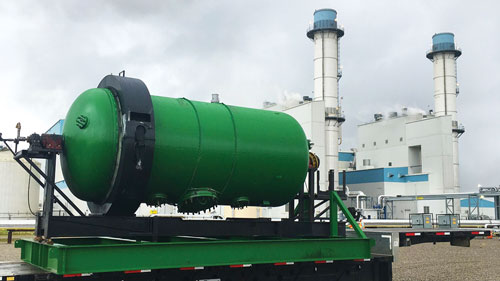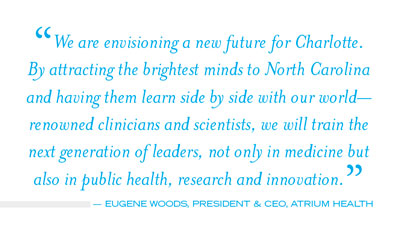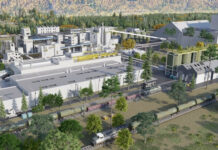By the BF Staff
From the September/October 2021 Issue
As Business Facilities has been reporting all year, the pandemic accelerated many trends that impact economic development, including dramatic shifts in workforce availability and migrations from large urban centers. It turns out that the reliance on the digital economy during the pandemic also has turbocharged the growth of startups and the startup ecosystems that support them.
According to Crunchbase, venture capital funding worldwide surged from $148 billion in the first half of 2020 to more than $288 billion, a 95 percent increase, with a huge influx in funding for early-stage startups. As of August, there were more than 800 startups valued at more than $1 billion, with a cumulative valuation of $2.6 trillion, tech market analysts CB Insights report.
Startup Genome’s 2021 Global Startup Ecosystem Report, the most comprehensive overview of worldwide startup activity, says the strength of the growth and productivity of entrepreneurial ecosystems in 2021 has accelerated “the dispersal of success,” as locations around the world have raced to pull together the essential elements of a successful startup ecosystem. The report says that in 2021 more than 90 ecosystems worldwide have succeeded in launching at least one startup valued at $1 billion or more.
Our cover story showcases locations that have succeeded in creating vibrant startup ecosystems across a wide variety of growth sectors. Read on and find out how they did it.
MICHIGAN: VENTURE CAPITAL FUELS STARTUP GROWTH
Michigan’s startup ecosystem spans the entire state and has been on an upward trajectory with Crunchbase naming Michigan the fastest growing state for venture capital investment with a growth of 886 percent in the last five years. The state’s venture dollars increased from $300 million in 2016 to $3.1 billion last year, including three times as many investments in 2020 as 2019, in the midst of a global pandemic.
In addition to the state’s longstanding presence in the life sciences, automotive and mobility industries, startups within the state are gaining traction in fast-growing industries such as enterprise B2B software, cybersecurity and consumer technologies.

Detroit-based StockX, one of five unicorn companies in Michigan, helped the state reach new investment heights. The fast-growing online marketplace completed a $275 million Series E funding round last year, one of the largest rounds of venture capital funding raised in Michigan history. In April, the company added an additional $255 million in new capital, bringing their valuation to nearly $4 billion.
And while not every company is a unicorn, startups across the ecosystem are benefitting from increased investor interest in the state. The Michigan Venture Capital Association (MVCA) 2021 Annual Research Report revealed 165 venture-backed startups in the state, an increase of 17 percent over the last five years. Nearly $50 million in angel capital has been invested in 102 Michigan startups, and the number of angel investors increased 258 percent over the course of the last five years.
The MVCA report also highlighted the state’s robust entrepreneurial economy. Michigan venture investors helped back nearly every Michigan venture-funded startup, and the valuation of venture capital funds under the management of firms headquartered in the state in 2020 was $2.8 billion, an increase of 28 percent over the last five years.
More than 23 percent of Michigan’s venture capital (VC)-backed startups are located in Detroit. In the last year, a report by EntryPoint found 24 startup companies in the Detroit area attracted more than $316.5 million from VC firms—more than five times the amount raised in 2020. The region is also building on its growing reputation as a tech hub, with startup companies across Wayne County having raised a total of $806.3 million in VC funds, marking a 333 percent increase in total capital raised over the past seven years.
The Michigan Economic Development Corporation’s Entrepreneurship and Innovation team works across a network of technical support services and early stage funding initiatives to help startups accelerate research, license intellectual property, access funding and engage with other Michigan businesses as they take their projects from ideation to commercialization.
One of the key elements of the MEDC’s entrepreneurial ecosystem are the 21 SmartZones and five innovation hubs through the nationally recognized Michigan Translational Research and Commercialization (MTRAC) program located throughout the state. These technology clusters include business accelerators that help facilitate the commercialization of technology emerging from research in Michigan universities and private companies.
TechTown, Detroit’s SmartZone accelerator, plays a key role in building an inclusive and equitable economy in the city and across Southeast Michigan. Between 2007 and 2020, TechTown Detroit served more than 4,500 companies at its Midtown hub and in neighborhoods across Detroit, Hamtramck and Highland Park. These businesses created 1,600 jobs and leveraged more than $172 million in startup/growth capital.
“Over the past decade, TechTown built out the nation’s most inclusive and diverse pipeline and pathway for small business support,” said Ned Staebler, president and CEO of TechTown. “We’ve identified and removed barriers for thousands of entrepreneurs as they advanced from ideation to launch to growth. In the process, we’ve helped break cycles of intergenerational poverty and helped Detroiters realize their dreams of owning and operating a business or tech startup.”
Javier Evelyn, founder of Alerje, a Detroit-based company that develops digital tools for food allergy management, worked with the TechTown team to develop his original idea through mentorship, introductions with key investors and experts to help with pitch programs. Additionally, TechTown helped Alerje apply for a Business Accelerator Fund (BAF) grant, which helped secure the startup’s first IP.
Other startups have taken note of Detroit’s rapidly developing reputation in the tech space. AirSpace Link is the leading North American provider of drone flight authorization and management solutions, and the company benefitted from Michigan’s startup ecosystem in nearly every phase of their growth. In May, AirSpace Link announced the completion of a $10-million series A capital raise, allowing them to continue paving the way for the drone economy. In addition to support from the Michigan Economic Development Corporation, AirSpace Link was supported by Detroit-based Rock Ventures, which has been committed to backing and founding early stage tech companies since 2010.
Rock Ventures also backed Detroit-based Guardhat, a pioneer in the IoT safety space, and has developed the world’s first and only comprehensive connected worker solution. The company offers software, cutting-edge wearable technologies and a proprietary Industrial IoT (IIoT) platform designed to keep workers safe in hazardous industrial environments.
These startups, and others across metro Detroit, speak to another critical aspect of the region’s entrepreneurial ecosystem—a growing portfolio of diverse-owned startups that is a result of the rich diversity found within metro Detroit, and also an intentional approach and commitment to supporting the growth of startups led by people of color, women and members of the LGBTQ+ community.
Of 38 active venture-backed startups in Wayne County, 11 of them are led by a person of color, five are led by a woman and one founder is a member of the LGBTQ+ community. Additionally, 10 active venture-backed startups headquartered in the City of Detroit are led by a CEO who is a person of color.
To maintain and grow the community’s diversity and build equitable access to resources and opportunities, several new talent development programs have been announced in recent months.
Apple is partnering with Michigan State University to host the first Apple Developer Academy in North America in Detroit. The Academy is designed to empower young, Black entrepreneurs cultivate skills needed in the growing tech industry and become world-class developers using Apple’s iOS ecosystem.
Wayne State University’s STEM Entrepreneurial Excellence Program is a 10-month business incubator program in Detroit for Black and African American women entrepreneurs or small-business owners of science, tech or tech-enabled companies. Michigan’s universities continue to be a critical pipeline not only for high tech talent, but also research and programs to commercialize university technology.
NEWARK, NJ: THRIVING ECOSYSTEM
Newark, NJ has emerged as a rising tech capital over the past decade. The city’s historical connection to innovation, its geographical footprint and its community of corporate citizens makes it an ideal location for growing startups. Some of the state’s major companies are based in Newark, including Prudential Financial, Panasonic North America, PSEG, Horizon Blue Cross Blue Shield and Audible, an Amazon.com, Inc. subsidiary, among others.
Newark is enjoying significant growth, private-sector investment and is home to top tier higher education institutions, which serve as a talent pipeline for tech companies, anchored by the Rutgers University-Newark and New Jersey Institute of Technology (NJIT) campuses.

Despite the COVID-19 pandemic, the city continues to offer opportunities to businesses and entrepreneurs looking for a place to thrive and innovate.
“The City of Newark has undergone a remarkable transformation over the past decade. As New Jersey’s largest city, Newark is experiencing an ongoing renaissance as more companies, startups and talent move to our thriving urban center,” said Jose Lozano, President & CEO of Choose New Jersey, New Jersey’s leading nonprofit economic development organization.
“Newark is an exceptional place to live, work and play, as well as a bustling hub for employment, commerce, education, arts and entertainment,” he added.
Newark has seen an increase in early-stage companies moving into the city, with industry leaders recognizing the value the city brings to their business. Newark was recently named among the top 10 best U.S. cities for computer programmers based on cost of living and job opportunities.
Audible, the leading creator and provider of premium audio storytelling, relocated to Newark in 2007 and has become a key player in the city’s burgeoning startup ecosystem. Newark Venture Partners (NVP), founded by Audible founder and Executive Chairman Don Katz, is catalyzing Newark’s tech revolution. The early-stage venture capital fund and accelerator, the most active investor in NJ, invests in B2B technology companies and enables startups to scale successfully. NVP companies have access to the subject-matter expertise of employees from NVP’s investors, including Audible, Prudential, RWJBarnabas Health and Horizon Blue Cross Blue Shield. NVP has attracted companies from all over the world to Newark, as well as investing in homegrown companies, with many graduate companies establishing locally.
An urban-centric location within eyesight of the largest market in the world, Newark is one of the most diverse, vibrant and connected cities in America. Newark has easy access to New York City, major transportation hubs and boasts a talented and diverse workforce.
Newark offers centrality, speed and accessibility. More than one million people move through Newark every day. Newark Liberty International Airport offers daily flights to nearly 175 non-stop destinations and is only 10 minutes from downtown. NJ Transit and PATH trains put New York City within an 18-minute commute. Amtrak rail access gets passengers to Boston, Massachusetts in four hours and to Washington, DC in three hours.
Newark defines cutting-edge bandwidth with 26 miles of underground municipal fiber that allows Newark to deliver top-caliber internet speeds and coverage. The outdoor Wi-Fi network is one of the largest and fastest in the country, delivering 400 megabits per second, making Newark one of the most connected cities in America.
New Jersey has the highest concentration of scientists and engineers per square mile than anywhere else in the U.S. Newark is a higher education hub, with more than 50,000 students and researchers. As the fifth-largest college town on the East Coast, Newark is anchored by two major campuses: Rutgers University-Newark and New Jersey Institute of Technology (NJIT).
Rutgers University-Newark is a remarkably diverse, urban, public research university that is not just in Newark but of Newark—an anchor institution of the city. It’s consistently ranked among the top five most diverse national universities in America in which over 20 percent of undergraduate students identify as Black or African American.
NJIT is one of the nation’s leading public polytechnic universities. NJIT is ranked the no. 1 university for upward student economic mobility by Forbes, and is ranked no. 1 in the NYC region and top 50 in the country for entrepreneurship studies by Princeton Review. In March 2021, NJIT and Ben-Gurion University of the Negev (BGU), two powerhouse universities in the fields of cyber technologies and environmental engineering, unveiled a partnership to create a world-class Institute for Future Technologies in New Jersey. The partnership aims to provide bespoke cyber technologies, civil and environmental engineering education, will conduct applied research and development, and will support innovation and entrepreneurship through technological commercialization efforts, creating the region’s next hub of tech innovation.
SK SILTRON PLANS $302M EXPANSION OF SEMICONDUCTOR WAFER PLANT IN BAY CITY, MI
Michigan-based SK Siltron CSS, a manufacturer of semiconductor wafers used in power system components, will invest $302 million and create up to 150 jobs over the next three years in Bay City, MI. The expansion will more than double the company’s Michigan employee base, which includes a plant in nearby Auburn, Mich.

The new semiconductor wafer manufacturing and R&D operation will help meet the demand for electric vehicle components and is supported by a $1.5 million Michigan Business Development Program performance-based grant. The company, a subsidiary of South Korea’s SK Siltron, considered sites in Georgia, North and South Carolina, Tennessee and Texas, but ultimately chose Michigan due to its talent and proximity to automakers.
“The growth of electric vehicles is opening an exciting new chapter for the auto industry as it provides consumers with more environmentally friendly transportation options,” said Jianwei Dong, chief executive officer for SK Siltron CSS. “SK Siltron CSS is proud to partner with the State of Michigan to build the supply chain and create the skilled jobs required to support the next generation of EVs, ensuring Michigan remains the automotive center of the world.”
The demand for power semiconductors is rapidly increasing as automakers enter the electric vehicle market and telecommunication companies expand 5G capabilities. SK Siltron CSS plans to expand production of much-needed silicon carbide wafers, considered the future of the industry because of their ability to efficiently transfer energy.
“The rise in popularity of electric vehicles has the auto industry searching for new innovative technologies to meet customer demand,” Dong said. “Our Michigan expansion will allow us to manufacture advanced materials that can enhance the performance of an EV and support the growth of a more sustainable automotive future.”
“SK Siltron’s high-profile commitment proves further evidence that Michigan remains a place where high-tech talent needs can be met and tech companies can grow, and we thank the company for its vote of confidence in our state and our workforce,” said Quentin Messer, Jr., CEO of the Michigan Economic Development Corporation (MEDC) and President and Chair of the Michigan Strategic Fund (MSF). “The company’s investment in Michigan is a clear example of how top attraction projects are finding opportunities to grow in the state, underscoring Michigan’s leadership position in electric vehicle R&D and manufacturing.”
A GROWING U.S. SUPPLY CHAIN FOR ELECTRIC VEHICLE COMPONENTS
The SK Siltron CSS expansion, pending state and local approvals, is part of a new domestic supply chain forming to provide the components required to support new environmentally friendly vehicles. The investment announcement comes as U.S. automakers are spending tens of billions of dollars to boost EV production and the Biden administration has sought $174 billion in funding to expand EV subsidies and charging networks.
The SK Siltron investment is the latest sign that electric vehicle suppliers are moving more production closer to their biggest customers in anticipation of booming demand, as automakers shift away from internal-combustion vehicles.
“As we build toward a more sustainable future, it is important that we create new, robust supply chains in the U.S. to support our corporations and the end consumer. The automotive industry has a tremendous opportunity with the rise of the electric vehicle, and we’re excited to see companies like SK Siltron CSS expanding to help support the transition to a green future,” said U.S. Secretary of Commerce Gina M. Raimondo.
The company will work closely with state and local partners to recruit and train potential employees. The project will attract high-wage jobs in high-tech manufacturing, ranging from semi-skilled operators to engineers, and will continue to strengthen Michigan’s automotive, mobility and advanced manufacturing industries.
Of the new employees, 70 percent will be skilled workers while 30 percent will be professional engineers.
The MSF also approved a 15-year State Essential Services Assessment exemption valued at $4.4 million. Monitor Township is considering a property tax abatement in support of the project, and MEDC approved a State Education Tax abatement to be used in conjunction with the local abatement. Bay Future, Inc. has worked with the company and the MEDC throughout the process offering staff time and resources in coordinating site selection activities, identifying and bringing local resources and resource partners to the table, and more.
“SK Siltron CSS is a world class, high tech company that could have chosen to invest anywhere in the world. We are appreciative that they decided to choose to invest here in Bay County. Our community, region and state have a storied history of manufacturing, specifically in the automotive industry,” said Bay Future, Inc. President and CEO Trevor Keyes.
“This investment represents the future of that foundation where ingenuity and know-how will drive an engine of innovation and technology. We are pleased and thankful for having had the opportunity to work closely with the MSF, the MEDC and SK Siltron CSS to secure this significant capital investment and new job creating project,” Keyes added.
SK Siltron CSS manufactures a specialty wafer made of silicon carbide (SiC) that can be used in the semiconductor power components of electric vehicles. SiC wafers are more efficient at handling high powers and conducting heat than normal silicon. When used in EV system components, this characteristic can allow a more efficient transfer of electricity from the battery to the motor, increasing the driving range of an EV by 5 percent to 10 percent. The wafers can also reduce charging times, relax cooling requirements and shrink power module size and weight.
SK Siltron acquired the Michigan silicon carbide wafer business in 2019 and established SK Siltron CSS as a U.S. subsidiary. Since then, SK Siltron CSS has doubled its employee base in Michigan, currently employing approximately 130 skilled workers and professional engineers.
SK Siltron is part of SK Group, one of South Korea’s leading conglomerates. SK Group companies have been expanding their presence in the U.S. with multi-billion dollar investments in their own businesses and partnerships in renewable energy and sustainable technologies.
Some studies suggest the shift to electric vehicles will require fewer workers because EVs are mechanically simpler. It is unclear how many EV parts will be manufactured in the United States. In the last two years, Michigan has seen nearly $9 billion in planned investments and more than 10,000 jobs added as part of the EV transition.
Newark is not only attracting large-scale tech companies, but it’s home to leading incubators and investors that are focused on supporting BIPOC (Black, Indigenous and people of color) Entrepreneurs and small business owners.
Newark Venture Partners (NVP) is delivering on its promise to attract early-stage companies to Newark to help catalyze the city’s tech ecosystem. To date, NVP has invested $42 million into 97 portfolio companies with nearly 1,200 employees, and more than 50 percent of NVP’s portfolio companies are founded by women or people of color. NVP is a top 10 micro-VC investing in Black and Latinx-founded companies in the U.S., according to Crunchbase’s “Diversity Spotlight 2020” report.
“There are thousands of companies from around the world vying to be a part of Newark Venture Partners,” said Aisha Glover, VP of Urban Innovation at Audible. “We invest in these startups with the intention of them permanently planting roots in Newark, creating jobs and helping to grow the city’s innovation ecosystem.”
Among the startups that NVP has helped to fund include 1Huddle, a workforce tech company based in Newark that upskills, trains and motivates employees using science-backed, quick-burst mobile games, and MindRight, a Newark startup which provides culturally responsive mental health coaching over text messaging. MindRight customers include AmeriHealth Caritas, one of the largest Medicaid insurers in the country looking to tackle social determinants of health within their youth population. MindRight was founded by Ashley Edwards, the first Black female founder to raise $1 million in VC in New Jersey and one of 35 to ever do so in the United States. Edwards is also a Forbes 30 under 30 Social Entrepreneur.
With 55 established businesses, 98,000 square feet of office and lab space and 11,000 square feet of coworking space, VentureLink@NJIT is the state’s largest startup incubator, providing programming, workspace and expert mentorship to resident companies.
In addition to the coworking and office space, the incubator’s programming includes monthly workshops, professional and social networking events and one-on-one coaching sessions—all of which are available to the public, bringing the assets of NJIT to the Newark entrepreneurial community.

Thanks to a gift from the Paul Profeta Foundation, VentureLink@NJIT is establishing an Entrepreneur-in-Residence Fellowship for BIPOC Entrepreneurs. The program—scheduled for its first cohort in early October—will provide support, workspace, mentorship and a small stipend to entrepreneurs from unstable economic backgrounds. Its goal is to facilitate an on-ramp to the entrepreneurial ecosystem for motivated individuals who don’t have access to big-money financial backing.
“VentureLink holds a unique place in the Newark and broader New Jersey entrepreneurial ecosystem. And we understand how important our role is to that community. Polytechnics have driven a lot of deep science and engineering innovation nationwide. We are always striving for ways to build on-ramps to that technical store for the community,” added William Lutz, NJIT’s Director of Commercialization.
Choose New Jersey facilitated a partnership between VentureLink@NJIT and the National Association of Software and Services Companies (NASSCOM), the premier trade body and chamber of commerce for the tech industry in India.
=SPACE is an innovative coworking space and incubator based in Newark. Part of =SPACE’s mission is to address the underrepresentation of diverse, successful entrepreneurs, particularly in tech. Founders CITI Medina and Rafael Roman designed a space for founders to feel welcome to work and share ideas.
“There is no other city that could provide the kind of innovation ecosystem and culture of true diversity that we needed to build our coworking space,” Medina said.
Beyond desks and suites for rent, =SPACE offers free programming that includes business strategy sessions and VC chats. More than 90 percent of its programming is free and they host more than 50 programs a year ranging from art shows and photography courses to financial planning and profit classes to support the Newark entrepreneurial community. In 2020, =SPACE held more than 50 virtual events during the height of the pandemic, and over 45,000 people streamed content. =SPACE is part of New Jersey Economic Development Authority (NJEDA)’s NJ Ignite program that enables qualified startups to apply rent free.
CALGARY: INNOVATING FOR SOCIAL GOOD
Situated in the foothills of the Canadian Rocky Mountains, the city of Calgary is home to pioneering, community-minded innovators with a signature entrepreneurial spirit and a thirst for adventure. No surprise, Calgary is also climbing in the ranks as a leading technology and innovation ecosystem in North America.
Led by its economic strategy, Calgary in the New Economy, the city’s vision is to be a top destination for the world’s best entrepreneurs who embrace innovation to solve global challenges. What might be surprising is how many of those companies are focused on doing social good.

“Calgary is on the map for being Canada’s most adventurous tech city. This is a place where you can build anything—the next big thing—whether it’s driving technological advances or social good,” said Brad Parry, Interim President and Chief Executive Officer of Calgary Economic Development. “Major cities around the world are facing a precipice with disruption from the pandemic to energy supply and climate change. Fortunately, Calgary is on the right path. The time is right for this city to become an innovation center for global solutions across diverse industry sectors.”
TECHNOLOGY REVOLUTIONIZING HEALTH CARE IN THE CHARLOTTE REGION
In a time of rapid innovation, the Charlotte Region has emerged as a destination for technological talent of all kinds. From engineering and tech talent in a thriving manufacturing sector to software development and information security talent in a growing financial services industry, and to analytical talent using tech to drive decision-making in the region’s many corporate headquarters operations, Charlotte is on the rise in more ways than one.

More than 52,000 high-tech talent individuals live and work in Charlotte, making North Carolina’s largest city a magnet for this workforce. The Charlotte Region is also experiencing a greater need for tech talent in the health care industry—a demand that is only expected to rise as a new era of health care is underway in the area. Atrium Health, Wake Forest Baptist Health and Wake Forest School of Medicine have combined as one enterprise: Atrium Health. This combination will bring a second medical school campus to Charlotte, which has historically been the largest city in the U.S. without a four-year medical school. The Wake Forest School of Medicine – Charlotte is part of an ambitious strategy to advance health care innovation from Winston-Salem to Charlotte with the vision of redefining the health care sector in the Charlotte Region and catalyzing economic development for years to come.
“This is an exciting time for Atrium Health, the Charlotte Region and beyond,” said Eugene A. Woods, president and CEO of Atrium Health. “In developing our new medical school, we are envisioning a new future for Charlotte and for the entire state. By attracting the brightest minds to North Carolina and having them learn side by side with our world-renowned clinicians and scientists, we will train the next generation of leaders not only in medicine but also in public health, research and innovation.”

The growth of the tech industry in Charlotte has been a driving factor in its economic expansion, and the explosion of health care–related growth in the sector is also shaping the region’s future in technology. The Charlotte Region is a growing health care hub that is home to national and international leaders in the field. In fact, the health care sector is so crucial to the region’s economy that one in nine individuals living in the area are currently employed in the field—that’s more than 120,000 diverse workers, each with different skill sets and educational levels. And the arrival of Charlotte’s first four-year medical school will only accelerate health care innovation and offerings in the region.
“Atrium Health is proud of its role in positioning the Charlotte Region as an emerging global leader by creating an innovation-led health care corridor, and technology will play a critical role in that effort,” Woods said. “We witnessed firsthand the success of Wake Forest’s Innovation Quarter in Winston-Salem, which strengthened the regional workforce and transformed the whole community. So, we are going to expand upon these rich, dynamic spaces by designing a complementary Innovation District in Charlotte and link the two to create an innovation corridor spanning across the region. This will not only elevate the city but also make it the destination center for innovation in the country.”
Think about what attracts someone to a particular city—education, economic mobility and health care are likely at the top of the list. All three components, Woods notes, are critical to the Charlotte Region’s long-term success, and he has challenged Atrium Health to build a health care ecosystem that takes the region to a completely new level with technology as a driving force in that effort.
“Technology has revolutionized the way that we take care of our patients and our communities,” Woods said. “The whole idea behind technology is how care will continue to be delivered going forward, including for telehealth visits. We’re looking at technology in completely different ways than ever before. That’s the future of health care.”
Charlotte’s health care and technology sectors are poised to grow, making now the perfect time to consider the region for your next expansion or relocation. For more information, visit altogetherbetterclt.com.
Bright minds from around the world are choosing Calgary for its burgeoning innovation ecosystem where entrepreneurs are encouraged to try, learn, iterate and adapt to new technology. It helps that the city boasts a supportive business environment with the lowest corporate tax rate in Canada, affordable class ‘A’ downtown office space and a multitude of accelerators and incubators that help turn big ideas into billion-dollar unicorns.
As the tech and innovation ecosystem grows, the city is poised for growth. A study with IDC Canada forecasted Calgary companies will lead the $20 billion Cdn in spending on digital transformation in the province of Alberta from 2021 to 2024. Calgary is also hardwired with one of the most extensive fiber optic networks in Canada and a wealth of dark fiber that makes it a hub for 5G development and a leader in overall connectivity in the country.
As the city embraces the opportunity in this era of disruption and digitalization, credit for building solutions for social good belongs to its people—local Calgarians and newcomers alike—who are making a difference and making a name for the city.
Take Benevity, a Calgary-based software company and global leader in corporate purpose software. A 2020 investment from U.K. investment firm Hg, turned it into the latest billion-dollar unicorn, or “Canadian narwhal” in Calgary. Benevity’s software helps companies and their employees bring their community goals to life and amplifies the impact of corporate giving, volunteering and individual and collective action. Its software is available in 20 languages and has processed more than $6 billion in donations, 34 million hours of volunteering time, 275,000 positive actions and has awarded over one million grants to 300,000 nonprofits worldwide.
When asked about what makes Calgary the best city for entrepreneurs solving global challenges at a 2021 London Tech Week panel discussion, Steven Woods, Chief Technology Officer of Benevity, pointed to the city’s pioneering past in traditional industries.
“If we look back historically, Alberta’s had a very resource-based economy with farming and oil and gas, which are very innovative, entrepreneurial, comfort-with-risk kind of environments,” said Woods. This creative problem-solving mindset in the community, pared with top tech talent coming out of universities in the region, makes Calgary a prime place to go from idea to an early-stage venture.
Known as an expert in all things energy, the city is also an internationally recognized leader in the energy transition. The city is making headlines as the center of Canada’s carbon innovation pivot with the launch of a new downtown Energy Transition Centre and a carbon removal accelerator by Avatar Innovations, the University of Calgary and the XPRIZE Foundation.
“It’s a really good place for someone in a startup like mine,” said Apoorv Sinha, CEO and Co-Founder of Carbon Upcycling Technologies. “The ecosystem is well developed and looking for some wins.”
Sinha’s vision for Carbon Upcycling Technologies is to become the world’s most impactful carbon utilization company. It is already the first company to reduce cement and concrete’s carbon footprint by double digits with enhanced concrete additives, while exceeding strength activity performance by 40 percent.
Also speaking as an ambassador of Calgary’s tech scene at London Tech Week was Danika Kelly, Co-Founder and CEO of My Normative, an app for women with an aim to disrupt female erasure in modern Western health science. A recent study by Alberta Enterprise Corporation noted the province has more female tech founders than the global average, and female participation in its technology sector is over twice the Canadian average.
“Calgary is good at the fostering of initial steps into entrepreneurship and social enterprise,” said Kelly. “If you have a good idea, the ecosystem, including the City of Calgary, the province of Alberta, the federal government, has so many programs and platforms in place you can leverage.”
One of those programs is the City of Calgary’s $100 million Cdn Opportunity Calgary Investment Fund (OCIF), which was created as a catalyst to attract investment, drive innovation and spur transformative economic development in the city. Projects that receive OCIF backing drive innovation in key sectors, but it has evolved to also support early-stage companies and ecosystem accelerators to create and scale more local companies.
Calgary Economic Development also administers a Trade Accelerator Program (TAP), an innovative four-session initiative, which helps local businesses expand and export globally.
One of several startup and scaleup success stories from TAP Calgary is Ellie Bianca, an all-natural, cruelty-free, sustainably-sourced luxury skin care company, founded by environmental scientist, chemist and African-Canadian, Evelyne Nyairo.
Nyairo supports the empowerment of women through business and education and sources shea butter and oil from women-run co-ops in Africa. Ellie Bianca ships worldwide and is now sold at major Hudson’s Bay department stores across Canada.
From feeding and fueling, to healing and moving—and socially-conscious skincare—Calgary is a city that is both changing with the world and helping to change the world.
With adventurous roots, the 1988 Winter Olympics host city is now the third most diverse city in Canada with 43 international consulate offices and a community comprised of more than 240 ethnic origins and 120 languages spoken. It has attracted global citizens and retained one of the youngest and most STEM-educated workforces with double-digit growth in tech talent and total tech jobs over the past five years.
It’s listed among the Top 50 North American markets in CBRE’s 2021 Scoring Tech Talent report and consistently ranks as a top livable city in the world.
In the past two years, NYSE-listed tech giants Infosys and Mphasis have chosen to expand in Calgary, the latter will also open a Centre of Excellence for the development of quantum technologies with the University of Calgary. Top global business accelerators Endeavor and SVG Ventures | THRIVE also established operations in Calgary and the Royal Bank of Canada plans to open a new Calgary Innovation Hub for fintech.
DIGITAL INFRASTRUCTURE FUELS GROWTH IN DOUGLAS COUNTY, GA
Digital Infrastructure is at the core of the growth of industry in Douglas County, GA. Industry giants like Google and Microsoft call Douglas County home, along with Switch, PWC, T5 and Stack. Douglas County is designed for data centers.
Douglas County benefits from the intersection of the country’s largest fiber routes and every major fiber provider possesses a core interconnection point in Atlanta, including Bandwidth Infrastructure Group’s announcement in September 2020 of expanding their high capacity, dark fiber network from Atlanta to Douglas County, creating 50 route miles and more than 93,000 fiber miles.
In addition to connectivity, Douglas County competes on key decision-making factors. Energy is abundant, reliable and redundant, and costs are on average 50 percent of the national average. The risk of natural disasters impacting operations is low as significant seismic events and extreme weather are rare. Technology based projects may be offered substantial state and local incentive packages which aim to reduce the initial startup cost and attract quality jobs to the area. Land prices in Douglas County are comparatively lower than other major national markets.
Strategically located, Douglas County is 25 minutes from downtown Atlanta and Hartsfield-Jackson International Airport, making it a prime location not only for data centers and technology firms but also headquarters, back-office operations, FinTech and manufacturing. Within 30 miles there are 13 colleges and universities, and 70 percent of all college graduates from metro Atlanta institutions remain in the region when starting their career. Access to the world and talent are key assets of Douglas County.
The robust infrastructure, including energy and fiber, access to major freeways and Hartsfield-Jackson International Airport, lower taxes, a qualified workforce and a business-friendly climate makes Douglas County a top choice for technology-based industry.














![[VIDEO] Get More for Your Business in Ardmore. Oklahoma](https://businessfacilities.com/wp-content/uploads/2024/02/maxresdefault-324x160.jpg)

Helpful article. Thank you for the sharing.
Startup India Kit